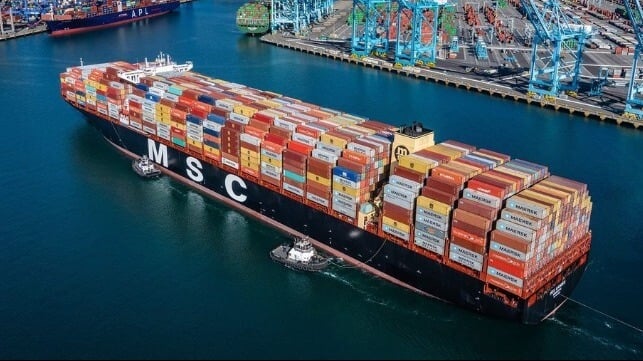MSC and Maersk Agree to Terminate 2M Alliance in 2025

MSC Mediterranean Shipping Company (MSC) and Maersk have agreed to terminate their eight-year alliance known as 2M when it comes up for renewal in 2025. The move comes as the two largest container carriers have taken divergent strategies and the three alliances in the container industry came under repeated political criticism as freight rates soared over the past few years.
“MSC and Maersk recognize that much has changed since the two companies signed the 10-year agreement in 2015,” the companies said in a joint statement. “Discontinuing the 2M alliance paves the way for both companies to continue to pursue their individual strategies.”
The alliance came about as the container industry was rapidly growing and seeking to build global networks. Similar alliances, known as Ocean Alliance and The Alliance, emerged involving the other major carriers leading to the recent criticism by elected officials and regulators that cited the dominance of the three alliances. By some estimated, the alliances controlled as much as 90 percent of the capacity on major shipping routes.
According to the carriers, the goal of the alliances was to ensure competitive and cost-efficient operations on the major trade lanes. As part of the agreements, the carriers share space among their ships on key routes and maintain regular schedules on the routes through a combination of vessels from the different carriers.
MSC commenting after the announcement of the agreement said “2M was introduced at a time when the ocean carrier industry needed an injection of stability.” Having grown dramatically in recent years to become the world’s largest carrier in 2022, MSC says it however expects the concept of ocean liner vessel-sharing to remain relevant and beneficial to carriers and their customers.
“At MSC today, we continue to strengthen and modernize our fleet, providing us with the scale we need for the most comprehensive ocean and short-sea shipping network in the market,” commented Soren Toft, CEO of MSC. While notoriously private about details of its business and strategy, MSC is believed to have the industry’s largest orderbook, over 130 vessels with 1.8 million TEU capacity according to Alphaliner, and in 2022 was an aggressive acquirer of secondhand vessels. There had been industry speculation that MSC, with a total capacity currently standing at over 4.6 million TEU, was outgrowing the alliance.
Maersk over the past few years has taken a different approach focusing on building out its logistics operations with a series of large acquisitions. Recently retired CEO Soren Skou had said the carrier was comfortable with its current size of approximately 4.2 million TEU capacity. Maersk has said its recent shipbuilding orders are fleet replacement and the start of its environmental effort to transition to methanol to fuel its operations.

that matters most
Get the latest maritime news delivered to your inbox daily.
Under the terms of the 2015 agreement, the 2M alliance was set to run for at least 10 years. It required a two-year notice period for termination. Both carriers are saying they will work with their respective clients during the phase-out of the 2M alliance.
While both carriers are saying the decision had nothing to do with the political criticism of the alliances, today’s announcement started immediate speculation on the fate of the other two alliances. Smaller, non-aligned carriers were able to gain market positions over the past few years with niche services but as overall volumes declined an analysis by Sea-Intelligence showed these smaller carriers were again losing share to the three alliances. In addition to the alliances, the major carriers also have agreements with many smaller and regional carriers developed over the past few years as the industry moved toward a greater emphasis on regional hubs and feeder networks.
